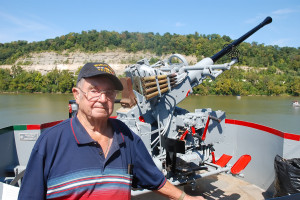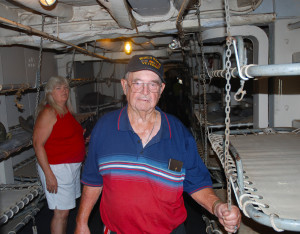By Chris Erwin
On June 5, 1944, plans were made for Operation Overlord. However, bad weather on the days leading up to the operation caused it to be delayed for 24 hours. On the morning of June 5, after meteorologist predicted improved conditions for the following day, Eisenhower gave the go-ahead for Operation Overlord. He told the troops: “You are about to embark upon the Great Crusade, toward which we have striven these many months. The eyes of the world are upon you.”
They set sail from England for the trip across the Channel to France. While more than 11,000 aircraft were mobilized to provide air cover and support for the invasion, some 156,000 American, British and Canadian forces landed on five beaches along a 50-mile stretch of the heavily fortified coast of France’s Normandy region. The invasion was one of the largest amphibious military assaults in history.

My dad, Claude Erwin stood on the deck of a small ship, one of the LST (Landing Ship Tank) crafts; it is from here he begins to tell me what he remembered about the D-day invasion.
We visited the LST 325 this past week and while he was curious about the ship sitting in the Ohio River, his interest seemed to fade as we stood in the heat waiting to board the ship. By the time we made it on the ship he was visually annoyed. November 2, he will be 94-years-old and the hot sun was beginning to alter his normal pleasant disposition. As we boarded the ship, he appeared to recover from the heat and much like everyone else he looked at the displayed articles but showed no real emotion — until we moved into the areas where the Army bunked.
As he looked at the hanging bunks one just over the other, he ran his hand over the lacing on canvas bunks. He turned to me “do you smell that” he said, the smell was of coal oil. “This is where we stayed,” he said, as he grabbed the rail and turned back to me. I snapped a picture. I could see him begin to get teary eyed.
“This is the only place I remember about these boats other than getting in the land craft,” he touted, as we slowly walked through the rows of bunks. He stopped again, looking down at the floor. I could tell it was coming back to him. He became strangely quiet as we finished our tour.
We had dinner and then went back to his house. It was at this point, where he could sit, that it started rolling out of him. He needed to tell me what he was feeling, and I was eager to listen.
Standing on that ship just after dawn June 6, 1944 waiting to get in the landing craft, he said, “I could see all the way up the beach as far as the eye could see, they were ships all of them firing artillery toward the beach.” Airplanes were so close to each other it didn’t (seem) possible,” he said. “As we loaded in the landing craft we were told the Rangers would be the first to hit the beach, and we were to take the beach and secure it.”

“As we got closer to the beach we could hear the machine-gun fire. We were all scared. We knew the second that loading ramp hit the beach, we were sitting ducks. Gun fire was getting louder and the tattering of bullets hitting the boat had us all on edge.”
“We felt the boat hit bottom. The front ramp fell. We were about three feet short of the beach. We bailed out the boat like we were on fire, water splashing in our face. Dead Rangers scattered the beach still clutching their guns. Our goal was to make it to the barbwire, and the sand was like heavy mud you just couldn’t run fast enough.”
“Two planes made a pass at the beach giving us cover and not one of our guys got hit as we made it to the wire. Our group was lucky that day; we all made it out alive but the 30 foot high hedge rows as we advance through France claimed many of us, it was a lot of hand to hand combat.”
By the time dad had finished recalling what he could remember, his hands were shaking and his voice cracking as he recalled the dead soldiers scattering the with beach guns in hand. Over 2,000 American lives were lost at the next beach, Omaha Beach.
The bravery these men displayed should make every one of you proud to be an American. Our freedom was paid by the blood of those men who were willing to face standing in those boats with bullets peppering the hull.
Many of them never made it one step and were shot before they even got out of the boats.
My dad was one of the lucky ones; they just happen to get air cover at the right time.


I visited the beaches a few years ago . It is amzaing to me that these brave troops made the landing and some of them lived to tell about it. The cemetary there is huge. We owe hose guys a lot.